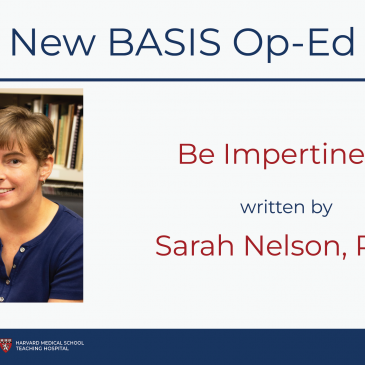Editor’s note: Sarah E. Nelson, PhD is the Director of Research at the Division on Addiction, Cambridge Health Alliance and an Associate Professor in the Department of Psychiatry at Harvard Medical School. Dr. Nelson’s work covers many facets of addiction, including gambling, impaired driving, and mental health and addiction among Tribal youth and communities. Her gambling work has focused on predicting the development of gambling problems through analysis of online gambling records, examining specific characteristics of sports gambling that might relate to the development of gambling problems, and evaluating gambling interventions such as voluntary self exclusion. As an extension of that work, Dr. Nelson has developed an interest in the accuracy, use, and potential problems with those predictive models and other uses of AI in the gambling sphere. This op-ed is part of our Special Series in Honor of Dr. Howard Shaffer.
 About a year ago, I was preparing to give a webinar on artificial intelligence in gambling spaces. Chris Reilly, then the Executive Director of the International Center for Responsible Gaming, was tasked with introducing me. As I was zoning out, expecting the usual introduction, I instead heard her introduce me as someone who asks impertinent questions. Just then, I knew I’d done Howard proud.
About a year ago, I was preparing to give a webinar on artificial intelligence in gambling spaces. Chris Reilly, then the Executive Director of the International Center for Responsible Gaming, was tasked with introducing me. As I was zoning out, expecting the usual introduction, I instead heard her introduce me as someone who asks impertinent questions. Just then, I knew I’d done Howard proud.
According to the Oxford English Dictionary (OED), the word impertinent derives originally from Latin, impertinens, meaning irrelevant (i.e., not pertaining). The original definitions of the word – irrelevant, unrelated, not belonging, unsuitable, absurd – hardly evoke something to aspire to. But the fourth definition in the OED, emerging in the 1600s, suggests the meaning of the word began to shift. Sure, the fourth definition includes rude, insolent, disrespectful. But it also includes “characterized by presumptuous speech or behavior,” and “lacking in deference.” Perhaps that still doesn’t sound all that positive? The Merriam Webster Dictionary includes the definition “not restrained within due or proper bounds especially of propriety or good taste” and notes that impertinent “implies exceeding the bounds of propriety in showing interest or curiosity or in offering advice.” Between the 1400s and the 1800s, the conventional use of the word moved from focusing on irrelevance to a focus on ignoring or being in conflict with social convention (and perhaps doing so a bit brazenly). Bingo. Did I mention that the title slide for my webinar included an illustration from The Emperor Has No Clothes?
I’ve known Howard since I joined the Division in 2003. I was fresh out of graduate school and not so much interested in a specific discipline or area of study as in finding a place where I could ask interesting questions and analyze data to find the answers to those questions. The Division provided just such a place, primarily because Howard never shies away from an interesting (or impertinent) question, and often asks many of his own to probe whatever statement or opinion or thought you might present. Howard always asks impertinent questions. And he often does it with a glint in his eye. Why can’t you be addicted to carrots? Aren’t dependence and addiction actually independent phenomena? Is a response rate of 60% actually acceptable, or just conventional? There are times when it seems he asks a question or makes a seemingly outlandish statement just to get a rise out of someone. And maybe he does.
And yet, some of Howard’s ideas, that seem almost conventional now, were outlandish and, dare I say, impertinent, when he posed them. He was one of the first to study gambling as a possible behavioral manifestation of addiction, turning what we knew about addiction on its head. The syndrome model of addiction, moving the center of addiction away from objects and instead to the nexus between object, individual, and environment, re-framed the way we think about what it means to be addicted. Howard’s penchant for asking impertinent questions, and for thinking outside the box, though it may rub some people the wrong way, rubs off on the rest of us in a very positive way. It makes him willing to value curiosity and critical thinking over convention and traditional expertise, to take chances on junior colleagues who actively engage a subject, and to push boundaries that, frankly, need pushing. And it has made him not only a cutting-edge researcher, but also a skilled and extraordinary mentor. I hope his impertinence continues to carry through in the work we do at the Division.
– Sarah Nelson, PhD




